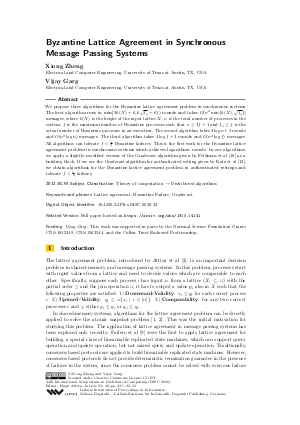Byzantine Lattice Agreement in Synchronous Message Passing Systems
Authors Xiong Zheng, Vijay Garg
-
Part of:
Volume:
34th International Symposium on Distributed Computing (DISC 2020)
Part of: Series: Leibniz International Proceedings in Informatics (LIPIcs)
Part of: Conference: International Symposium on Distributed Computing (DISC) - License:
 Creative Commons Attribution 3.0 Unported license
Creative Commons Attribution 3.0 Unported license
- Publication Date: 2020-10-07
File

PDF
LIPIcs.DISC.2020.32.pdf
- Filesize: 493 kB
- 16 pages
Document Identifiers
Related Versions
-
Full paper hosted on https://arxiv.org/abs/1910.14141.
Subject Classification
ACM Subject Classification
- Theory of computation → Distributed algorithms
Keywords
- Lattice agreement
- Byzantine Failure
- Gradecast
Metrics
- Access Statistics
-
Total Accesses (updated on a weekly basis)
0Document
0Metadata
Abstract
We propose three algorithms for the Byzantine lattice agreement problem in synchronous systems. The first algorithm runs in min {3h(X) + 6,6√{f_a} + 6}) rounds and takes O(n² min{h(X), √{f_a}}) messages, where h(X) is the height of the input lattice X, n is the total number of processes in the system, f is the maximum number of Byzantine processes such that n ≥ 3f + 1 and f_a ≤ f is the actual number of Byzantine processes in an execution. The second algorithm takes 3log n + 3 rounds and O(n² log n) messages. The third algorithm takes 4 log f + 3 rounds and O(n² log f) messages. All algorithms can tolerate f < n/3 Byzantine failures. This is the first work for the Byzantine lattice agreement problem in synchronous systems which achieves logarithmic rounds. In our algorithms, we apply a slightly modified version of the Gradecast algorithm given by Feldman et al [Feldman and Micali, 1988] as a building block. If we use the Gradecast algorithm for authenticated setting given by Katz et al [Katz and Koo, 2006], we obtain algorithms for the Byzantine lattice agreement problem in authenticated settings and tolerate f < n/2 failures.
Cite As Get BibTex
Xiong Zheng and Vijay Garg. Byzantine Lattice Agreement in Synchronous Message Passing Systems. In 34th International Symposium on Distributed Computing (DISC 2020). Leibniz International Proceedings in Informatics (LIPIcs), Volume 179, pp. 32:1-32:16, Schloss Dagstuhl – Leibniz-Zentrum für Informatik (2020)
https://doi.org/10.4230/LIPIcs.DISC.2020.32
BibTex
@InProceedings{zheng_et_al:LIPIcs.DISC.2020.32,
author = {Zheng, Xiong and Garg, Vijay},
title = {{Byzantine Lattice Agreement in Synchronous Message Passing Systems}},
booktitle = {34th International Symposium on Distributed Computing (DISC 2020)},
pages = {32:1--32:16},
series = {Leibniz International Proceedings in Informatics (LIPIcs)},
ISBN = {978-3-95977-168-9},
ISSN = {1868-8969},
year = {2020},
volume = {179},
editor = {Attiya, Hagit},
publisher = {Schloss Dagstuhl -- Leibniz-Zentrum f{\"u}r Informatik},
address = {Dagstuhl, Germany},
URL = {https://drops.dagstuhl.de/entities/document/10.4230/LIPIcs.DISC.2020.32},
URN = {urn:nbn:de:0030-drops-131106},
doi = {10.4230/LIPIcs.DISC.2020.32},
annote = {Keywords: Lattice agreement, Byzantine Failure, Gradecast}
}
Author Details
Funding
- Garg, Vijay: This work was supported in parts by the National Science Foundation Grants CNS-1812349, CNS-1563544, and the Cullen Trust Endowed Professorship.
References
-
Yehuda Afek, Hagit Attiya, Danny Dolev, Eli Gafni, Michael Merritt, and Nir Shavit. Atomic snapshots of shared memory. Journal of the ACM (JACM), 40(4):873-890, 1993.

-
Hagit Attiya, Maurice Herlihy, and Ophir Rachman. Atomic snapshots using lattice agreement. Distributed Computing, 8(3):121-132, 1995.

-
Hagit Attiya and Ophir Rachman. Atomic snapshots in o (n log n) operations. SIAM Journal on Computing, 27(2):319-340, 1998.

-
Michael Ben-Or, Danny Dolev, and Ezra N Hoch. Simple gradecast based algorithms. arXiv preprint arXiv:1007.1049, 2010.

-
Gabriel Bracha. Asynchronous Byzantine agreement protocols. Information and Computation, 75(2):130-143, 1987.

-
B. A. Davey and H. A. Priestley. Introduction to Lattices and Order. Cambridge University Press, Cambridge, UK, 1990.

-
Giuseppe Antonio Di Luna, Emmanuelle Anceaume, Silvia Bonomi, and Leonardo Querzoni. Synchronous byzantine lattice agreement in 𝒪(log f) rounds. arXiv preprint arXiv:2001.02670, 2020.

-
Giuseppe Antonio Di Luna, Emmanuelle Anceaume, and Leonardo Querzoni. Byzantine generalized lattice agreement. arXiv preprint arXiv:1910.05768, 2019.

-
Jose M Faleiro, Sriram Rajamani, Kaushik Rajan, G Ramalingam, and Kapil Vaswani. Generalized lattice agreement. In Proceedings of the 2012 ACM symposium on Principles of distributed computing, pages 125-134. ACM, 2012.

-
Paul Feldman and Silvio Micali. Optimal algorithms for Byzantine agreement. In Proceedings of the twentieth annual ACM symposium on Theory of computing, pages 148-161. ACM, 1988.

-
Michael J Fischer, Nancy A Lynch, and Michael S Paterson. Impossibility of distributed consensus with one faulty process. Journal of the ACM (JACM), 32(2):374-382, 1985.

-
Jonathan Katz and Chiu-Yuen Koo. On expected constant-round protocols for byzantine agreement. In Annual International Cryptology Conference, pages 445-462. Springer, 2006.

-
Leslie Lamport, Robert Shostak, and Marshall Pease. The Byzantine generals problem. ACM Transactions on Programming Languages and Systems (TOPLAS), 4(3):382-401, 1982.

-
Marios Mavronicolasa. A bound on the rounds to reach lattice agreement. http://www.cs.ucy.ac.cy/ mavronic/pdf/lattice.pdf, 2018.

-
Thomas Nowak and Joel Rybicki. Byzantine approximate agreement on graphs. In 33rd International Symposium on Distributed Computing (DISC 2019). Schloss Dagstuhl-Leibniz-Zentrum fuer Informatik, 2019.

-
Jan Skrzypczak, Florian Schintke, and Thorsten Schütt. Linearizable state machine replication of state-based crdts without logs. arXiv preprint arXiv:1905.08733, 2019.

-
TK Srikanth and Sam Toueg. Simulating authenticated broadcasts to derive simple fault-tolerant algorithms. Distributed Computing, 2(2):80-94, 1987.

-
Xiong Zheng and Vijay Garg. Byzantine lattice agreement in synchronous systems. arXiv preprint arXiv:1910.14141, 2019.

-
Xiong Zheng and Vijay Garg. Byzantine lattice agreement in asynchronous systems. arXiv preprint arXiv:2002.06779, 2020.

-
Xiong Zheng, Vijay K. Garg, and John Kaippallimalil. Linearizable Replicated State Machines With Lattice Agreement. In Pascal Felber, Roy Friedman, Seth Gilbert, and Avery Miller, editors, 23rd International Conference on Principles of Distributed Systems (OPODIS 2019), volume 153 of Leibniz International Proceedings in Informatics (LIPIcs), pages 29:1-29:16, Dagstuhl, Germany, 2020. Schloss Dagstuhl-Leibniz-Zentrum fuer Informatik.

-
Xiong Zheng, Changyong Hu, and Vijay K Garg. Lattice agreement in message passing systems. In 32nd International Symposium on Distributed Computing (DISC 2018). Schloss Dagstuhl-Leibniz-Zentrum fuer Informatik, 2018.

